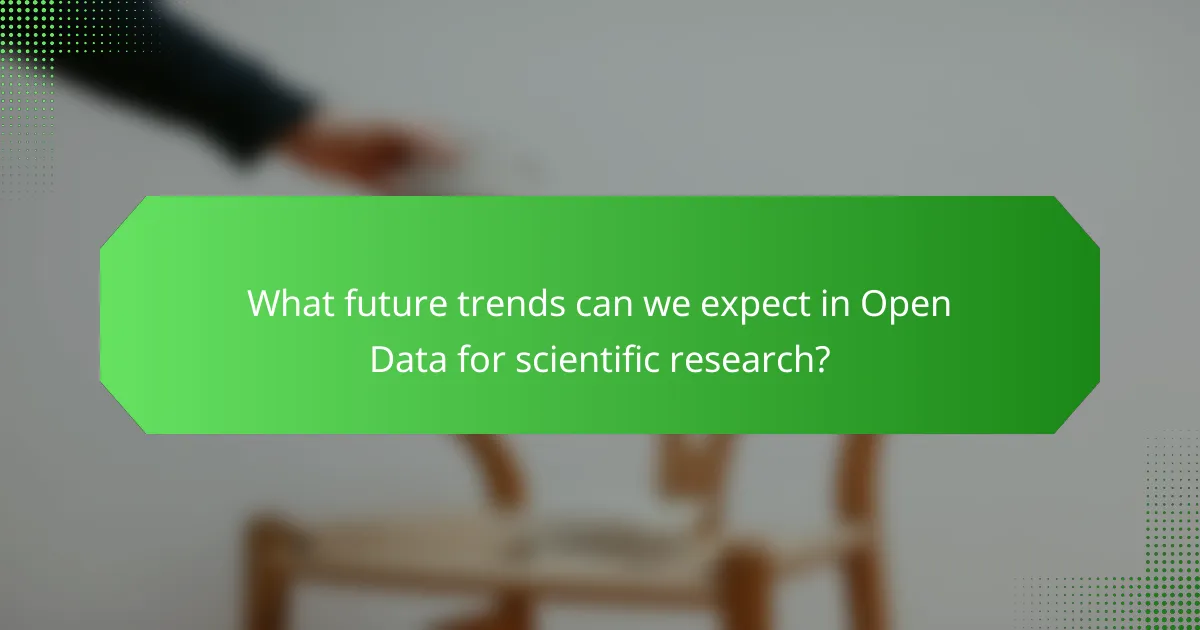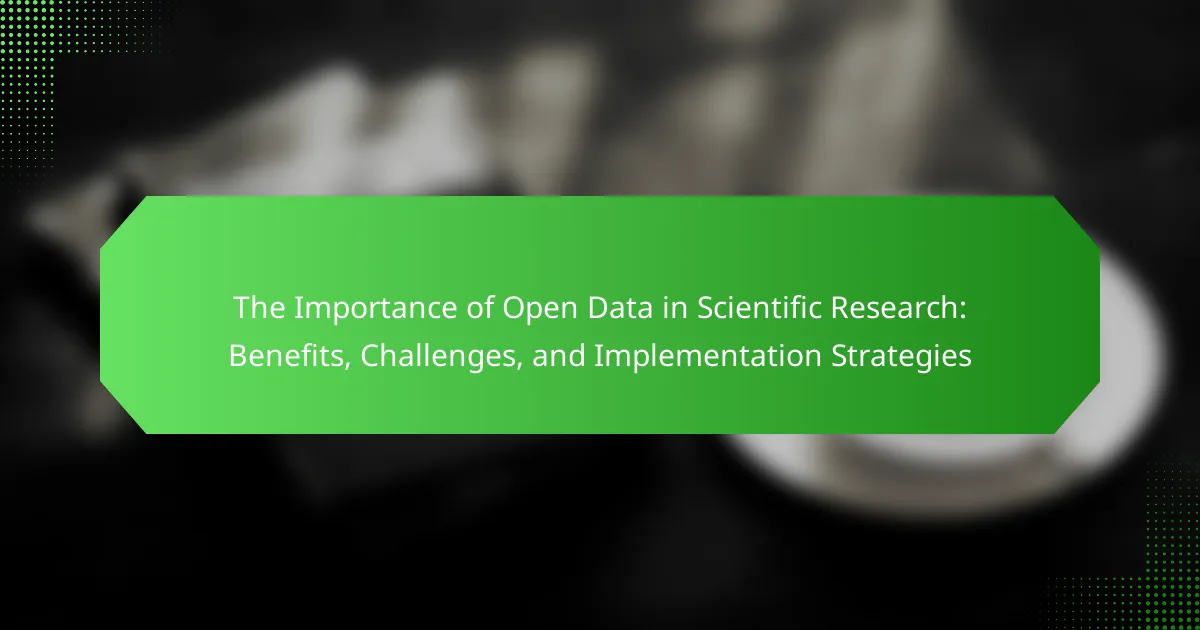Open data is a critical component of scientific research, enhancing transparency, reproducibility, and collaboration among researchers. It allows for the verification of findings and the building upon previous work, leading to innovative solutions and increased citation rates. Open data democratizes access to information, enabling participation from researchers in developing countries and fostering public engagement with science. Future trends indicate greater collaboration, improved data interoperability, and the integration of artificial intelligence in data analysis, all of which support the integrity and efficiency of scientific research. Overall, the implications of open data are significant, driving advancements in the scientific community and society at large.

What is the Importance of Open Data in Scientific Research?
Open data is crucial in scientific research as it enhances transparency and reproducibility. It allows researchers to verify findings and build upon previous work. Open data fosters collaboration among scientists, leading to innovative solutions. It also democratizes access to information, enabling researchers from developing countries to participate. According to a 2018 study by Piwowar et al., open data increases citation rates by 20%. Furthermore, open data accelerates the pace of discovery by facilitating data reuse. This leads to more efficient research processes and better-informed scientific decisions. Overall, the importance of open data lies in its ability to improve the quality and accessibility of scientific research.
How does Open Data contribute to scientific advancements?
Open Data significantly contributes to scientific advancements by enhancing accessibility to research data. This availability allows researchers to validate findings and replicate studies. Open Data fosters collaboration among scientists across disciplines and institutions. It accelerates the pace of discovery by enabling the sharing of insights and methodologies. For instance, the Human Genome Project utilized Open Data to facilitate global collaboration in genomics. According to a study published in “Nature,” Open Data can increase citation rates and improve research quality. Furthermore, Open Data supports transparency and accountability in research practices. This openness helps to build public trust in scientific findings. Overall, Open Data is a catalyst for innovation and progress in the scientific community.
What are the key characteristics of Open Data?
Open Data is characterized by its accessibility, usability, and transparency. It is freely available for anyone to use, modify, and share. Open Data is often published in machine-readable formats. This ensures that it can be easily processed by computers. The data is typically accompanied by metadata, which explains its context and structure. Open Data supports collaboration and innovation by allowing diverse users to leverage the information. Furthermore, it promotes accountability by making data available for public scrutiny. According to the Open Data Handbook, these characteristics enhance the potential for scientific research and societal benefits.
Why is transparency crucial in scientific research?
Transparency is crucial in scientific research because it fosters trust and credibility. When researchers share their methodologies and data, it allows others to verify results. This verification process is essential for scientific integrity. Transparency mitigates biases and errors in research findings. Open data practices enable collaboration and innovation within the scientific community. According to a study published in PLOS Biology, transparency enhances reproducibility in research. Reproducibility is a cornerstone of scientific progress. Ultimately, transparency leads to more robust and reliable scientific knowledge.
What are the primary benefits of Open Data in research?
Open Data in research provides enhanced transparency and reproducibility of studies. Researchers can access and verify data, leading to increased trust in findings. Open Data facilitates collaboration among scientists, fostering innovation and cross-disciplinary research. It allows for larger sample sizes and diverse datasets, improving the robustness of results. Additionally, Open Data can accelerate scientific discovery by enabling faster analysis and sharing of insights. According to a 2020 study published in “Nature,” open access to data increased citation rates by 30%. This demonstrates the tangible impact of Open Data on research effectiveness and visibility.
How does Open Data enhance collaboration among researchers?
Open Data enhances collaboration among researchers by providing accessible datasets for shared analysis. It fosters transparency, allowing researchers to verify and build upon each other’s work. Open Data encourages interdisciplinary collaboration, as diverse fields can benefit from the same datasets. It reduces duplication of efforts, as researchers can utilize existing data instead of collecting new data. According to a study published in “Nature” by Tenopir et al. (2011), 86% of researchers believe that sharing data accelerates scientific discovery. This shared resource model promotes innovation and accelerates the pace of research advancements.
What role does Open Data play in accelerating innovation?
Open Data significantly accelerates innovation by providing unrestricted access to data for analysis and development. It enables researchers, businesses, and individuals to collaborate more effectively. Open Data fosters transparency and accountability in various sectors. This data can lead to new insights, products, and services. According to a report by the McKinsey Global Institute, Open Data can generate over $3 trillion in economic value annually. By leveraging Open Data, organizations can reduce research and development costs. This access also promotes faster problem-solving and idea generation. Ultimately, Open Data acts as a catalyst for innovation across diverse fields.
What challenges are associated with implementing Open Data?
Implementing Open Data faces several challenges. Data privacy concerns arise when sensitive information is shared publicly. Ensuring data quality is another significant issue. Inconsistent data formats can hinder usability. Additionally, lack of technical expertise may prevent effective implementation. Stakeholder engagement is often inadequate, leading to poor adoption rates. Legal and regulatory barriers can complicate data sharing. Funding limitations also pose challenges for sustaining Open Data initiatives. These factors collectively impact the successful implementation of Open Data.
What privacy concerns arise with Open Data sharing?
Open Data sharing raises significant privacy concerns. The primary issue is the potential for personal data exposure. Open datasets may inadvertently include sensitive information about individuals. This can lead to unauthorized identification and profiling. An example is the re-identification of anonymized data, which has been documented in studies. Research by Sweeney (2000) demonstrated that 87% of the U.S. population can be uniquely identified by just three data points: ZIP code, birth date, and gender. Additionally, there is a risk of data misuse by third parties. These parties may exploit shared data for malicious purposes, such as discrimination or surveillance. Overall, the balance between data transparency and individual privacy is a critical challenge in Open Data initiatives.
How can data quality issues impact research outcomes?
Data quality issues can significantly impact research outcomes by leading to inaccurate results. Poor data quality can result from errors in data collection, processing, or analysis. These inaccuracies can skew findings and lead to incorrect conclusions. For instance, a study published in the journal “Nature” found that data errors led to a 30% misinterpretation rate in research conclusions. Additionally, low-quality data can reduce the reproducibility of research, undermining its credibility. This is critical, as reproducibility is a cornerstone of scientific integrity. In summary, data quality issues compromise the reliability and validity of research outcomes.
How can researchers effectively implement Open Data strategies?
Researchers can effectively implement Open Data strategies by establishing clear data management plans. These plans should outline data collection, storage, and sharing protocols. Researchers should also utilize standardized formats for data to ensure interoperability. Engaging with stakeholders early in the process fosters collaboration and enhances data relevance. Training sessions on data sharing practices can empower team members. Furthermore, researchers should comply with relevant legal and ethical guidelines to protect sensitive information. Regularly updating datasets and maintaining transparency about data quality is essential. A study by the European Commission highlights that such practices increase data usability and research impact.
What best practices should be followed for data sharing?
Best practices for data sharing include ensuring data quality, protecting privacy, and using standardized formats. Data should be accurate, complete, and up-to-date to maintain integrity. Privacy protection is essential; anonymizing sensitive information helps prevent misuse. Utilizing standardized formats facilitates interoperability and accessibility across different platforms. Clear documentation of data sources and methodologies enhances transparency. Establishing data sharing agreements can clarify rights and responsibilities. Regular audits of shared data ensure compliance with regulations. Engaging stakeholders in the data sharing process fosters collaboration and trust.
How can researchers ensure compliance with data policies?
Researchers can ensure compliance with data policies by implementing systematic protocols. They should familiarize themselves with relevant regulations and institutional guidelines. Regular training sessions on data management practices are essential. Researchers must also maintain clear documentation of data handling procedures. Conducting periodic audits can help identify compliance gaps. Collaboration with data governance teams provides additional support. Utilizing data management plans ensures alignment with policies from the outset. Engaging in open communication with stakeholders fosters accountability and transparency.

What are the implications of Open Data on the scientific community?
Open Data significantly enhances collaboration and transparency within the scientific community. It allows researchers to share their findings and datasets freely. This accessibility accelerates the pace of discovery and innovation. Open Data fosters reproducibility of research results, which is crucial for scientific validation. According to a study published in PLOS Biology, open access to data leads to increased citations and visibility of research. Furthermore, it encourages interdisciplinary collaboration, as scientists from different fields can utilize shared data. Open Data also supports public engagement and trust in science by making research more accessible to non-experts. Overall, the implications of Open Data are profound, driving advancements and improving the integrity of scientific research.
How does Open Data influence public trust in research?
Open Data enhances public trust in research by promoting transparency and accountability. When data is openly accessible, researchers are held to higher standards. This accessibility allows for independent verification of results. According to a study by the Open Data Institute, 87% of respondents believe that open data increases trust in research findings. Furthermore, transparency reduces the potential for misconduct. It fosters collaboration among researchers and the public. Open Data also empowers citizens to engage with research outcomes. This engagement leads to a more informed public, reinforcing trust in scientific processes.
What impact does Open Data have on reproducibility of studies?
Open Data significantly enhances the reproducibility of studies. It provides access to raw data, allowing other researchers to verify results. This transparency fosters trust in scientific findings. Studies show that open data practices can lead to increased citation rates and collaborative efforts. For instance, a 2018 study published in “Nature” indicated that open data increased reproducibility in biomedical research by over 30%. Furthermore, open data helps identify errors and biases in original studies. This collective scrutiny ultimately strengthens the integrity of scientific research.
How can Open Data foster inclusivity in scientific research?
Open Data can foster inclusivity in scientific research by providing equitable access to data for diverse communities. It allows researchers from underrepresented groups to engage in scientific inquiry. Open Data promotes collaboration across institutions and geographical boundaries. This collaboration can lead to innovative solutions to global challenges. Studies show that inclusive research teams produce more impactful results. For example, a report by the National Institutes of Health highlights that diverse teams enhance research quality and relevance. By democratizing access to information, Open Data empowers marginalized voices in the scientific community. This empowerment leads to a broader range of perspectives and ideas, ultimately enriching the research landscape.
What technological tools support Open Data initiatives?
Technological tools that support Open Data initiatives include data management platforms, APIs, and data visualization software. Data management platforms like CKAN and Dataverse facilitate the storage, sharing, and discovery of datasets. APIs allow developers to access and integrate data from various sources seamlessly. Data visualization software such as Tableau and Power BI helps users interpret and present data effectively. Additionally, cloud storage solutions like AWS and Google Cloud provide scalable infrastructure for hosting open datasets. These tools enhance accessibility, usability, and collaboration in Open Data projects.
What platforms are available for Open Data sharing?
Platforms available for Open Data sharing include GitHub, Figshare, and Zenodo. GitHub allows users to share datasets alongside code. Figshare provides a platform for researchers to upload and share their data openly. Zenodo is an open-access repository that enables researchers to share data and publications. Each of these platforms supports proper citation and accessibility of shared data. They also comply with various open data standards.
How do data management systems facilitate Open Data practices?
Data management systems facilitate Open Data practices by providing structured frameworks for data storage and access. They enable organizations to organize, catalog, and share datasets effectively. These systems support data interoperability, which allows different datasets to work together seamlessly. They also ensure compliance with Open Data standards, making data easily discoverable and usable. Additionally, data management systems often include tools for data quality assurance, ensuring that shared datasets are accurate and reliable. By automating data workflows, they reduce the time and effort required to publish data openly. Furthermore, they enhance collaboration by allowing multiple users to access and contribute to datasets simultaneously. Thus, data management systems play a crucial role in promoting transparency and fostering innovation in research through Open Data.

What future trends can we expect in Open Data for scientific research?
Future trends in Open Data for scientific research include increased collaboration, enhanced data interoperability, and greater public engagement. Collaboration among researchers will become more common, leading to shared datasets and joint projects. Enhanced data interoperability will allow different datasets to work together seamlessly. This will facilitate more comprehensive analyses and insights. Greater public engagement will encourage citizen science initiatives, allowing non-experts to contribute to research. Additionally, the use of artificial intelligence will improve data analysis and management. These trends will support transparency and reproducibility in research, ultimately benefiting the scientific community and society.
How will advancements in technology shape Open Data policies?
Advancements in technology will significantly shape Open Data policies by enhancing data accessibility and interoperability. Improved data storage solutions, such as cloud computing, allow for larger datasets to be stored and accessed easily. Technologies like APIs facilitate seamless data sharing between systems, promoting collaboration. Machine learning algorithms can analyze vast amounts of data efficiently, revealing insights that inform policy development. Furthermore, blockchain technology ensures data integrity and security, fostering trust in Open Data initiatives. According to a report by the World Wide Web Foundation, these technological advancements can increase public engagement and participation in data-driven decision-making.
What role will artificial intelligence play in analyzing Open Data?
Artificial intelligence will enhance the analysis of Open Data by automating data processing and deriving insights. AI algorithms can efficiently handle vast datasets, uncovering patterns that human analysts might miss. Machine learning models can predict trends based on historical data, improving decision-making. Natural language processing can analyze unstructured data, such as research papers or social media, extracting relevant information. AI tools can also identify anomalies in datasets, ensuring data quality and integrity. According to a McKinsey report, AI can improve data analysis speed by up to 10 times. This capability is crucial in scientific research, where timely insights can drive innovation and discovery.
How might Open Data evolve in response to global challenges?
Open Data may evolve through enhanced collaboration and interoperability among data sources. Increased global challenges, such as climate change and public health crises, necessitate better data sharing. Open Data initiatives will likely prioritize real-time data availability to address urgent needs. This evolution will include the integration of artificial intelligence for data analysis. AI can uncover patterns and insights that inform decision-making. Additionally, there will be a push for standardized data formats to facilitate easier access. Governments and organizations may adopt policies mandating open data practices. This shift aligns with the growing demand for transparency and accountability in addressing global issues.
What practical steps can researchers take to embrace Open Data?
Researchers can embrace Open Data by adopting several practical steps. First, they should assess their data management practices. This includes evaluating what data can be shared openly. Next, researchers should choose appropriate data repositories. These repositories should comply with Open Data standards. They must also ensure proper data documentation. Clear documentation helps others understand and use the data effectively.
Researchers should engage in training on Open Data principles. This training can enhance their skills in data sharing. They should also collaborate with other researchers. Collaboration can foster a culture of openness. Finally, researchers should advocate for Open Data policies within their institutions. Supportive policies can facilitate the adoption of Open Data practices.
How can researchers build a culture of Open Data in their institutions?
Researchers can build a culture of Open Data by promoting transparency and collaboration. They should establish clear policies that encourage data sharing. Providing training on data management and sharing practices is essential. Researchers can also create incentives for sharing data, such as recognition in publications. Hosting workshops and seminars can raise awareness about Open Data benefits. Collaborating with institutional leadership can help integrate Open Data into the organization’s mission. Engaging with the wider community fosters a supportive environment for data sharing. Evidence shows that institutions with strong Open Data policies enhance research quality and reproducibility.
What resources are available for learning about Open Data practices?
Resources for learning about Open Data practices include online courses, government websites, and academic publications. Platforms like Coursera and edX offer courses on Open Data principles and practices. The U.S. Government’s Data.gov provides guidelines and tools for Open Data implementation. The Open Data Handbook by the Open Knowledge Foundation serves as a comprehensive guide. Additionally, academic journals like the Journal of Open Data publish research on Open Data methodologies. These resources provide foundational knowledge and practical insights into Open Data applications.
The main entity of the article is Open Data in scientific research. The article outlines the importance of Open Data, highlighting its role in enhancing transparency, reproducibility, and collaboration among researchers. It discusses key characteristics of Open Data, the benefits it brings to research quality and public trust, and the challenges associated with its implementation, such as data privacy and quality issues. Additionally, it provides practical strategies for researchers to adopt Open Data practices and explores future trends and technological advancements that will shape Open Data policies in the scientific community.


